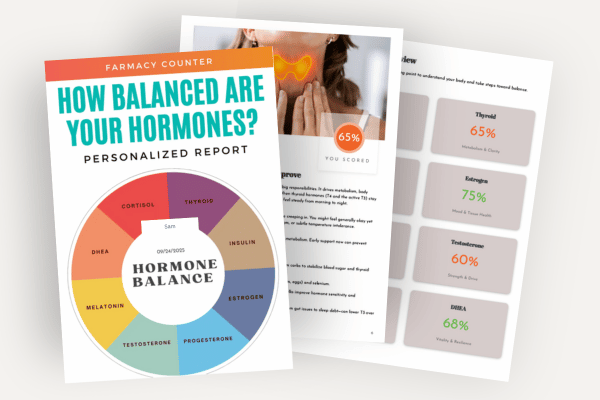
You might not notice the shift right away — but your hormones do.
Even a single night of poor sleep can throw off your internal clock — the circadian rhythm that governs nearly every hormone in your body. This rhythm acts as your body’s timekeeper, orchestrating when to release cortisol, melatonin, insulin, thyroid hormone, and even sex hormones. When sleep becomes inconsistent, that symphony starts to lose its rhythm.
Cortisol and the HPA Axis: Your Stress System on Overdrive
Cortisol — your natural alertness hormone — is designed to rise in the morning and gently fall at night. But when sleep is disrupted, that curve flattens. The HPA (hypothalamic–pituitary–adrenal) axis, which regulates your stress response, becomes dysregulated.
Instead of feeling refreshed, you wake up with cortisol already elevated, which can leave you wired but tired, anxious, or emotionally on edge. Over time, this pattern can contribute to adrenal fatigue symptoms — energy crashes, brain fog, and trouble winding down at night.
Hunger Hormones: Why You Crave Sugar and Caffeine
Two key hormones — leptin and ghrelin — also lose their rhythm when you’re underslept. Leptin (which tells your brain you’re full) decreases, while ghrelin (which stimulates appetite) increases. The result? Strong cravings for fast energy sources — sugar, refined carbs, caffeine — the very things that further disrupt your blood sugar and sleep quality.

Blood Sugar and Insulin Sensitivity
Sleep loss directly impacts insulin sensitivity, meaning your cells don’t respond as well to insulin’s signal to absorb glucose. Blood sugar spikes more easily and stays high longer, leading to the afternoon crash-and-crave cycle. Over time, this contributes to metabolic inflexibility and increased inflammation — both early signs of insulin resistance.
Reproductive and Thyroid Hormones
Chronic sleep disruption can also shift your sex and thyroid hormone balance.
- In women, disrupted sleep can alter estrogen and progesterone metabolism, often showing up as PMS changes, irregular cycles, or perimenopausal symptom flares.
- In men, testosterone levels can decline — even after one week of restricted sleep.
- Thyroid function may slow as the body attempts to conserve energy, compounding fatigue and mood changes.
Detoxification and Repair
Sleep is when your body does its deep repair work. During deep and REM sleep, the glymphatic system (your brain’s detox network) clears out metabolic waste, while the liver and mitochondria ramp up repair and regeneration. Without this nightly cleanup, inflammatory byproducts accumulate, further disturbing hormonal signaling.

In Functional Medicine Terms: Sleep Is Medicine
In functional medicine, we see sleep as one of the “core four” foundations — alongside nutrition, movement, and emotional balance. Without it, even the best supplements or protocols can only go so far.
Prioritizing sleep isn’t just about getting more hours — it’s about honoring your body’s natural timing systems:
- Go to bed and wake up around the same time each day.
- Limit blue light exposure after sunset to support melatonin production.
- Eat your last meal 2–3 hours before bed to stabilize insulin and cortisol.
- Create a wind-down ritual that signals safety to your nervous system — breathwork, stretching, journaling, or gratitude.
Sleep isn’t just rest — it’s recalibration. It’s the nightly reset that allows your hormones to synchronize, your energy to renew, and your body to move through each day with clarity, ease, and presence.
Ready to See Where Your Hormones Stand?
If you’re curious how your own hormone rhythms are functioning — whether sleep loss, stress, or lifestyle might be throwing things off — there’s an easy next step.
👉 Take the “How Balanced Are Your Hormones?” Quiz »
You’ll receive a free, personalized 13-page hormone report exploring 8 key hormone systems, including:
✅ A snapshot of your current hormone balance
✅ Insights into energy, mood, sleep, metabolism, and reproductive health
✅ Functional medicine–based tips and action steps to start rebalancing naturally
Think of it as your roadmap to reconnect with your body’s rhythm — and begin restoring the balance that helps you feel clear, steady, and strong.

How Balanced are Your Hormones?
Take our 3-minute quiz to discover your unique hormone balance—and get a personalized 13-page report with insights and actionable steps to support energy, mood, sleep, metabolism, and reproductive health.






